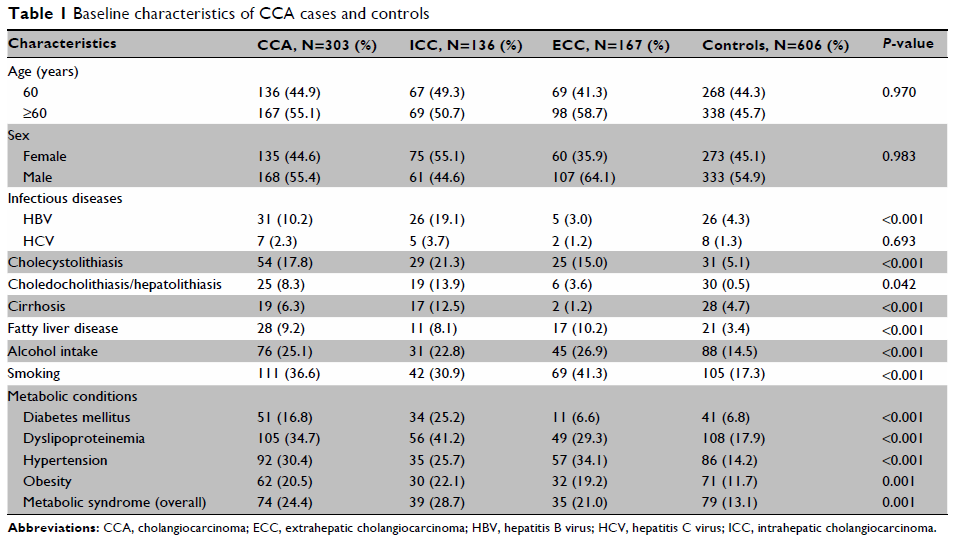108384
论文已发表
注册即可获取德孚的最新动态
IF 收录期刊
- 3.4 Breast Cancer (Dove Med Press)
- 3.2 Clin Epidemiol
- 2.6 Cancer Manag Res
- 2.9 Infect Drug Resist
- 3.7 Clin Interv Aging
- 5.1 Drug Des Dev Ther
- 3.1 Int J Chronic Obstr
- 6.6 Int J Nanomed
- 2.6 Int J Women's Health
- 2.9 Neuropsych Dis Treat
- 2.8 OncoTargets Ther
- 2.0 Patient Prefer Adher
- 2.2 Ther Clin Risk Manag
- 2.5 J Pain Res
- 3.0 Diabet Metab Synd Ob
- 3.2 Psychol Res Behav Ma
- 3.4 Nat Sci Sleep
- 1.8 Pharmgenomics Pers Med
- 2.0 Risk Manag Healthc Policy
- 4.1 J Inflamm Res
- 2.0 Int J Gen Med
- 3.4 J Hepatocell Carcinoma
- 3.0 J Asthma Allergy
- 2.2 Clin Cosmet Investig Dermatol
- 2.4 J Multidiscip Healthc

代谢综合征和胆管癌的风险:在中国进行的一项基于医院的病例对照研究
Authors Xiong J, Lu X, Xu W, Bai Y, Huang H, Bian J, Zhang L, Long J, Xu Y, Wang Z, Zhao H
Received 29 May 2018
Accepted for publication 31 July 2018
Published 24 September 2018 Volume 2018:10 Pages 3849—3855
DOI https://doi.org/10.2147/CMAR.S175628
Checked for plagiarism Yes
Review by Single-blind
Peer reviewers approved by Dr Andrew Yee
Peer reviewer comments 2
Editor who approved publication: Dr Antonella D'Anneo
Background: Metabolic syndrome is regarded as a risk factor for hepatocellular carcinoma. However, no research has been conducted to investigate the association between metabolic syndrome and cholangiocarcinoma (CCA), especially in the Chinese population. Herein, a hospital-based case–control study was carried out in China to explore the association between metabolic syndrome and CCA risk.
Patients and methods: In this study, 303 CCA patients (136 intrahepatic cholangiocarcinoma [ICC] and 167 extrahepatic cholangiocarcinoma [ECC]) were included, who were observed at Peking Union Medical College Hospital (PUMCH), from 2002 to 2014. Healthy controls were randomly selected from the database of PUMPH Health Screening Center. We retrospectively extracted metabolic syndrome and other possible risk factors from clinical records, followed by investigation of the relationship with CCA via calculation of ORs and 95% CIs using logistic regression analysis.
Results: Metabolic syndrome was significantly and positively correlated with all CCA subtypes, with adjusted ORs (AORs) of 0.35 (95% CI =0.29–0.42) and 0.29 (95% CI =0.19–0.44) for ICC and ECC, respectively (both P <0.001). Dyslipoproteinemia harbored a stronger relationship with ICC (OR =3.16; 95% CI =2.12–4.71) than ECC (OR =1.87; 95% CI =1.27–2.77), whereas hypertension harbored a stronger association with ECC (OR =3.09; 95% CI =2.09–4.58) than ICC (OR =2.06; 95% CI =1.32–3.21). Obesity was related to both ICC and ECC, with similar ORs, while diabetes was only related to ICC (OR =4.59; 95% CI =2.78–7.58), but not ECC (OR =0.97; 95% CI =0.49–1.94).
Conclusion: Metabolic syndrome was significantly related to a 1.86-fold elevated CCA risk.
Keywords: metabolic syndrome, cholangiocarcinoma, risk factors, case–control
